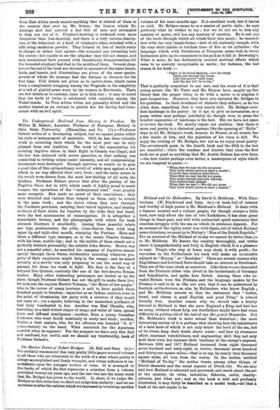The Shorter Poems of Robert Bridges. (G. Bell and Sons.
ls.)— We cordially recommend this very pretty little paper-covered volume to all those who are interested in the work of a man whose poetry is always accomplished and finely wrought, and whose influence is un- mistakable upon the younger writers of verse. It is arranged in five books, of which the first represents a selection from a volume published twenty-six years ago, and the last two are the latest work that Mr. Bridges has given to the world. In short, if we judge Mr. Bridges on this collection we shall not judge him unfairly ; and we see no reason to alter the opinion which we expressed in reviewing another
volume of his some months ago. It is excellent work, but it leaves us cold. Mr. Bridges seems to us a master of poetic style ; he says perfectly what he wishes to say ; but we do not see in him any mastery of metre, still less any mastery of emotion. He is not one of the reeds through which all winds blow into music ; he succeeds best with the very simple forms,—best of all, curiously enough, with the very short iambic or trochaic lines of five or six syllables ; the language which with Swinburne or Tennyson seems rich in vowel harmonies piles up its consonants in his path as it did in Browning's. What is more, he has deliberately courted metrical effects which seem to us scarcely recognisable as metre ; for instance, the last stanza in his book :—
"Fight, to be found lighting,—nor far awayi
Deem, nor strange thy doom. Like this sorrow 'twill come And the day will be to-day."
That is perfectly unmusical to our ears, and the worst of it is that young artists like Mr. Yeats and Mr. Binyon have caught up this theory that the proper thing to do with a metre is to disguise it past recognition. Moreover, they have also imitated Mr. Bridges in his quietism. In their avoidance of rhetoric they achieve, as he too often does, something that is very nearly dull. Mr. Bridges over- does landscape in his poetry : he is apt to give us inventories, as a prose writer may perhaps justifiably do, though even in prose the briefest suggestion of landscape is the best. But we have not space to review the book. We merely repeat our position : that there is more real poetry in a rhetorical passage like the opening of "Rolla " than in all Mr. Bridges's work, because de Musset, at all events, has a fire inside of him, and the pulsation of his verse is felt. We enjoy the writing of Mr. Bridges, but not as we enjoy great poetry. The seventeenth poem in the fourth book and the fifth in the last are beautiful ; while the rondeau and triolets that close the first book are as good as anything that Mr. Austin Dobson has ever done, —the first triolet perhaps even better, a masterpiece of style which we are tempted to quote :-
"When first we met we did not guess That Love would prove so hard a master ; Of ,more than common friendliness When first we met we did not guess. Who could foretell this sore distress, This irretrievable disaster
When first we met 7—We did not guess That Love would prove so hard a master."


















































 Previous page
Previous page